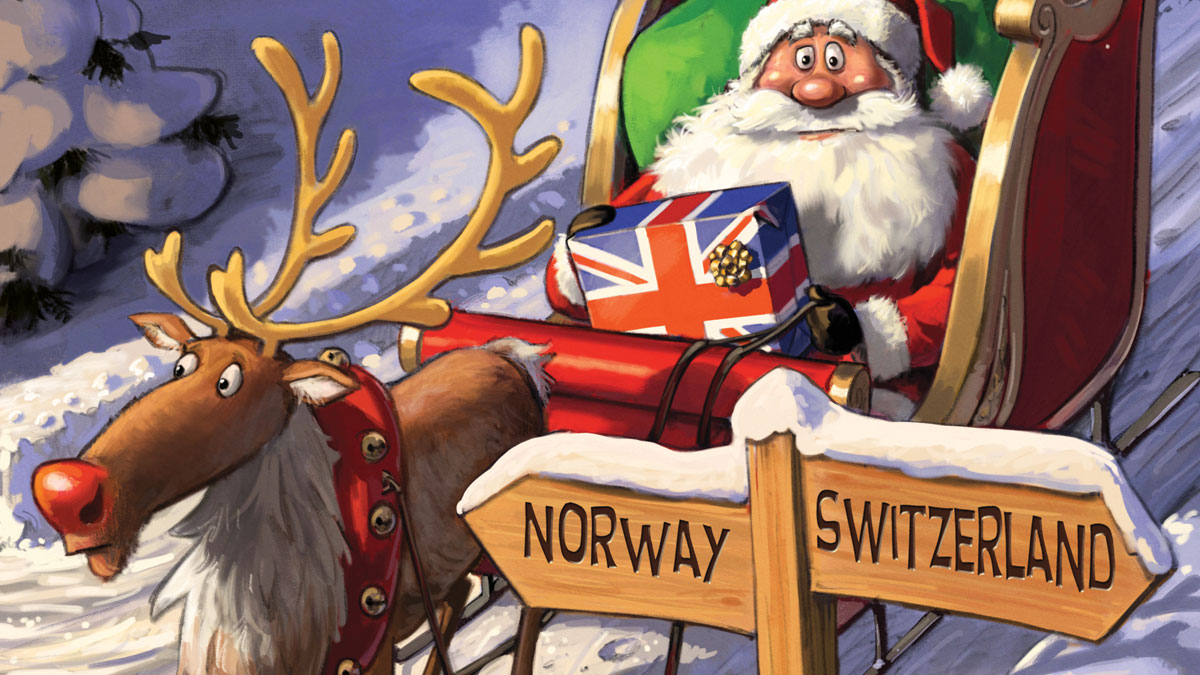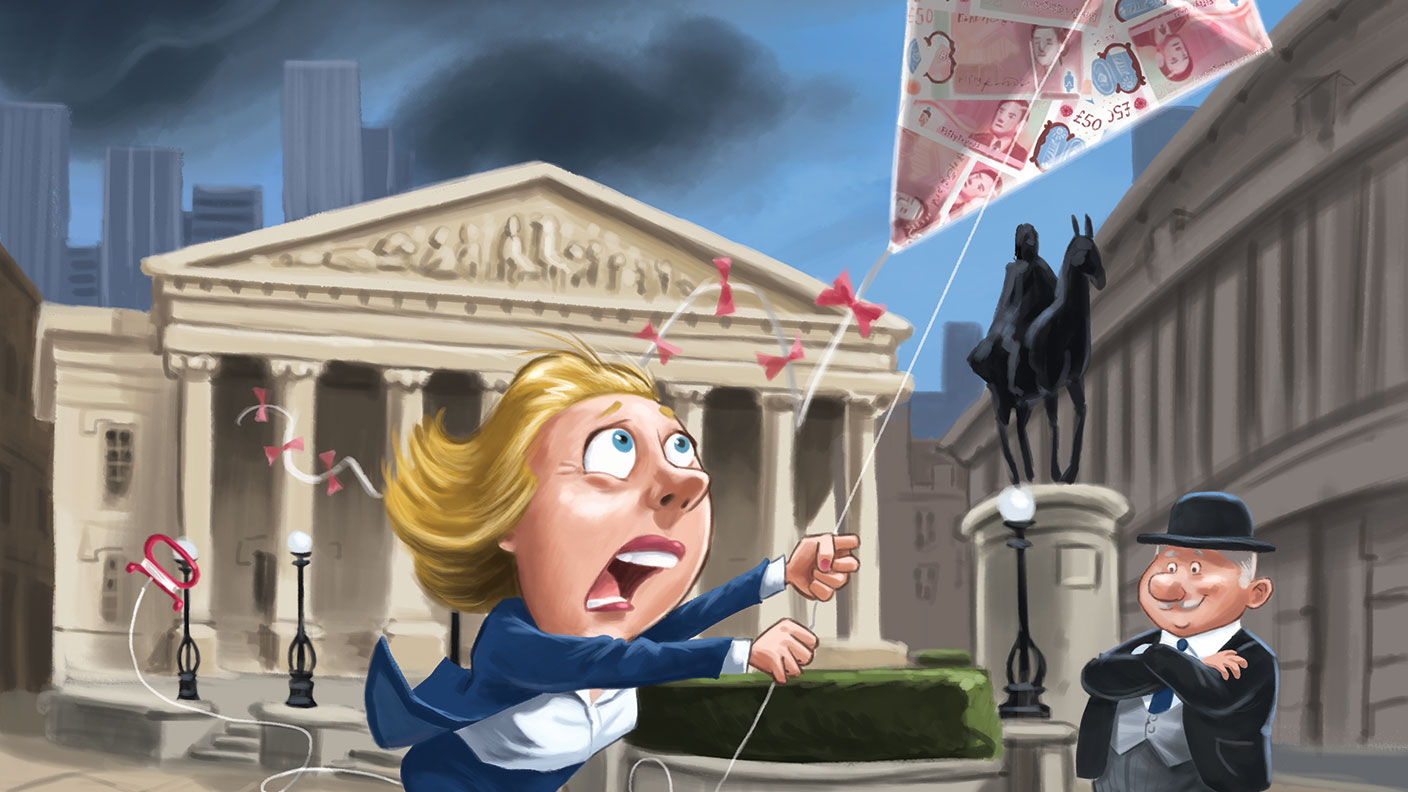Three roads to Brexit: which one should we take?
Britain is heading out of the EU. But there are many potential exit routes, each with advantages, each with potholes and delays. Matthew Partridge considers the three options.

Get the latest financial news, insights and expert analysis from our award-winning MoneyWeek team, to help you understand what really matters when it comes to your finances.
You are now subscribed
Your newsletter sign-up was successful
Want to add more newsletters?

Twice daily
MoneyWeek
Get the latest financial news, insights and expert analysis from our award-winning MoneyWeek team, to help you understand what really matters when it comes to your finances.

Four times a week
Look After My Bills
Sign up to our free money-saving newsletter, filled with the latest news and expert advice to help you find the best tips and deals for managing your bills. Start saving today!

Britain is heading out of the EU. But there are many potential exit routes, each with advantages, each with potholes and delays. Matthew Partridge considers the three options.
This year has been full of political surprises. But the biggest one for investors in the UK was undoubtedly the vote in June to leave the European Union. Six months on we have a new prime minister and a new chancellor, but we're still quite a way from knowing exactly what Brexit will look like.
Whatever else happens in 2017, Britain's path to leaving the EU is likely to dominate the political discussion and that means investors need to be prepared. Below I look at some of the main options from "hard" Brexit to "soft" Brexit and what lies between on the table. John Stepek looks at how things might unfold from here and how it could affect your investments.
MoneyWeek
Subscribe to MoneyWeek today and get your first six magazine issues absolutely FREE

Sign up to Money Morning
Don't miss the latest investment and personal finances news, market analysis, plus money-saving tips with our free twice-daily newsletter
Don't miss the latest investment and personal finances news, market analysis, plus money-saving tips with our free twice-daily newsletter
1. Hard Brexit: the WTO
The most radical Brexit option is simply to walk away from the EU. In this scenario we stop paying into the EU budget, abandon EU rules and laws we disagree with, and take control of our immigration and trade policies. The downside is that instead of having full access to the EU's 420 million consumers, we'd deal with the EU under World Trade Organisation (WTO) rules under the same terms as any other country outside Europe.
This wouldn't spell an end to trade, but it would mean facing tariffs (higher taxes on exports) and non-tariff barriers (higher costs in the form of additional red tape). The impact on trade would be exacerbated if the UK imposed tit-for-tat reciprocal tariffs.
Pros
A complete split from the EU, with the option to negotiate a free-trade deal with Europe without the artificial two-year deadline of the Article 50 process (see below) hanging over the talks. The instant removal of the UK contribution to the EU budget (about 14% of the whole) might concentrate minds when it comes to tariff conversations.
Cons
This is likely to be the most disruptive option in terms of short-term upheaval, higher trade costs, and potential barriers to exports, imports, and travel (although some pro-Brexit economists argue that unilaterally adopting free-trade policies with the rest of the world would boost business and offset some of the disruption). Companies who are considering leaving Britain for other shores would be more likely to act on their plans in the case of a hard Brexit.
2. Soft Brexit: the EEA
The European Economic Area (EEA) is an agreement between the EU and Iceland, Norway and Liechtenstein. These countries, along with Switzerland (more on which in a moment), are members of the European Free Trade Association (EFTA). They are not members of the EU, but they have near-full access to the single market, meaning their exports and imports are free of both tariff and non-tariff barriers. EEA membership also covers services, which would keep the City and the financial-services industry happy.
EEA membership does exclude agriculture and fisheries businesses, so we would need to negotiate deals on those sectors separately. However, that's no bad thing in fact, escaping the ruinous Common Agricultural Policy (CAP) is a very attractive feature of EEA membership.
The CAP's complex tariffs and quotas mean that in 2013 the price of food in the EU was 17% higher than the global average. Without the CAP, the UK would be free to import cheap, high-quality food from countries such as Australia and New Zealand, and from Latin American nations, provided they meet EEA product quality standards.
We would also be able to agree trade deals with other countries, although having automatic access to the single market would remove any pressure to rush through such deals. British firms would still have to comply with "rules of origin" regulations, designed to prevent non-EU companies from avoiding EU tariffs by importing foreign-made goods into the UK, then exporting them to the continent.
This would increase costs, but Brussels is currently overhauling the rules-of-origin process to make it less bureaucratic. We'd also be able to reduce our contribution to the EU budget substantially relative to its national income, Norway pays about half our level of contributions.
Given it already exists, EEA membership would be easy to agree in the two-year window between the government triggering Article 50 and the UK leaving the EU. A bespoke free-trade deal would likely take a lot longer. Ceta, the trade deal between Canada and the EU, took seven years to agree, meaning the government could find itself under pressure to sign off on a disadvantageous deal, or being forced into a hard Brexit by the two-year deadline.
Even the more pessimistic forecasters believe that EEA membership would reduce much of the economic downside they expect from Brexit. Professor John Van Reenen, formerly of the LSE's Centre for Economic Performance, which issued one of the most pessimistic forecasts for post-Brexit scenarios, reckons that in the short term the EEA route would cost just 1% of UK GDP, versus 3% under the hard Brexit route. Over the long run the difference in costs would be even greater.
We'd still need to follow EU laws pertaining to the single market, but EEA membership would remove the need to accept those that were primarily political rather than economic estimates suggest that Norway implements as little as a third of EU law. And while we would lose our primary role in creating European legislation, we would still be consulted and have a limited ability to challenge rules we didn't like. For example, Norway currently sits on 200 European Commission committees.
The biggest issue and it is a significant one with EEA membership is that members still need to abide by freedom of movement. There is scope to suspend this in exceptional circumstances, and Liechtenstein has negotiated its own tailored immigration regime. But as the Open Europe think tank points out, "it is highly questionable whether other EEA member states would agree to a similar deal for the UK" as for tiny, densely populated Liechtenstein.
Pros
The EEA offers a pre-existing template that would be hard for the EU to disagree with. Disruption to existing trade and travel arrangements would be minimised, while the UK could abandon the CAP and be free to pursue free-trade deals with third parties, which it cannot do right now.
Cons
EEA countries still have to abide by many EU rules, including freedom of movement, so there is limited scope for deregulation beyond agriculture and fisheries. They also contribute to the EU's coffers.
3. Bespoke Brexit: the Swiss option
Given that neither hard nor soft Brexit deliver exactly what the UK wants, Prime Minister Theresa May seems keen to keep her options open by opting for some sort of bespoke agreement that combines free trade for both goods and services, while at the same time ending freedom of movement. In the meantime, however, she has refused explicitly to rule anything out from staying in the EU's customs union (which would prevent us from cutting trade deals with third parties), or continuing to pay money to Brussels to access the single market.
The EU has repeatedly said that it considers free movement a vital part of any deal. Of course, it would say that this is a negotiation, after all but as Britain's former ambassador to Poland, Charles Crawford, points out, the attachment to the principle is genuine. Eastern European nations (generally sympathetic to Britain on many EU matters) consider the right to travel and work elsewhere in Europe an important symbol of their post-communist status as Western nations (and more prosaically, emigration is a key source of remittance money).
And it's not just eastern Europe. A pan-European poll by YouGov last month found that a huge majority of those in Germany, France, Denmark, Sweden and Finland would oppose a free-trade deal with the UK if we don't continue to allow freedom of movement. Indeed, a quarter of French and Germans oppose a free-trade deal irrespective of what the UK offers.
Is there a precedent for a bespoke deal? There is. Switzerland the fourth member of EFTA has had a free-trade agreement with the EU since 1972. However, in 1992 it narrowly rejected joining Norway, Iceland and Liechtenstein in EEA membership.
As a result, its relationship with the EU is based around a series of bilateral treaties. These started with ten main treaties that were signed in 1999, and implemented in 2002. At the moment, there are 210 treaties that give Switzerland wide access to the single market for goods and most (though not all) services, in exchange for limited contributions to the EU budget. Switzerland has also been able to negotiate free-trade deals independently with third parties.
The trouble is that the sticking point, once again, is freedom of movement. In a legally binding referendum in 2014 the Swiss voted to cap immigration from the EU. However, Brusselswarned that if Switzerland did so, then it would forfeit part of its access to the single market.
So in September just past, the Swiss parliament caved in arguing that while voters might have voted for an immigration cap, they didn't vote to ditch their free-trade deals with the EU. The Swiss government is now working to come up with a compromise such as requiring job offers to be posted in local job centres before being advertised abroad while many Swiss are pressing for a rerun of the 2014 referendum.
That said, while the German chancellor, Angela Merkel, has reiterated many times that "we cannot wobble on the basic principle of free movement of people", she has hinted that she is open to further concessions on access to benefits. Given that she is under growing domestic political pressure over her own immigration policy, it is possible that the room for manoeuvre widens in the coming months, although the European Commission may not be so keen to compromise on this front.
Pros
The closest thing to a "have your cake and eat it" option on the table a tailor-made package that allows the UK to do business in the EU, pursue trade deals elsewhere, and control its own borders all without any interruption of existing arrangements.
Cons
Given the EU's attachment to freedom of movement, and the perceived danger in giving Britain a better deal outside the EU than it has as a member, it's unlikely to be easy to negotiate a bespoke deal that gives the UK everything it wants particularly in the time allowed by Article 50.
Timeline: Article 50 and Europe's hectic election year
January 2017 the Supreme Court rules: in November the High Court ruled that the prime minister could not trigger Article 50 without the consent of Parliament. The government appealed. Next month, the UK's Supreme Court will rule on that appeal. Should the ruling go against the government (and there's a good chance that it will), MPs and the House of Lords will have to vote on whether or not to trigger Article 50.
It's conceivable that either the Commons or the Lords could hold up, or even block, the Article 50 process. That said, a non-binding vote in the Commons this month saw a majority of MPs vote in favour of triggering Article 50 by the start of April 2017, in exchange for Prime Minister Theresa May agreeing to publish her Brexit strategy before then.
15 March general election in the Netherlands: the first big European election of the year sees far-right anti-EU politician Geert Wilders of the Party for Freedom (PVV) go up against the current prime minister, Mark Rutte. While the PVV might become the largest party, the other parties are likely to form a coalition under Rutte to keep Wilders out of power.
31 March Article 50 triggered: May wants to trigger Article 50 by the end of March, which would signal the start of official talks on Britain's exit from the EU. May has said that she has no desire to extend the negotiation process, which would mean leaving by April 2019. At that point, the Great Repeal Bill which transposes EU law into domestic law will be in place to provide some continuity.
23 April & 7 May presidential election, France: after the first round vote in April, the two candidates left standing for French president are expected to be Marine Le Pen, leader of the far-right National Front, and a man who has been described as the French Margaret Thatcher, Franois Fillon. Le Pen has promised a referendum on France leaving both the EU and the euro.
22 October federal election, Germany: German chancellor Angela Merkel is expected to win a fourth term with her Christian Democratic Party, but with a reduced majority. However, the far-right Alternative for Germany party is capitalising on immigration concerns, having beaten the Christian Democrats in Merkel's home state of Mecklenburg-Vorpommern in September.
Beware economists bearing forecasts

Britain should be in recession right now, writes John Stepek. In July, a survey of 30-odd economists by Bloomberg found that on average they expected the UK economy to shrink by 0.1% in both the third and fourth quarters of 2016 as a direct result of the vote to leave the EU. As it stands, the economy grew by 0.5% last quarter and shows every sign of growing by a similar amount in this one. The oft-cited fact that Brexit hasn't happened yet is a poor excuse everyone knew it wouldn't occur overnight.
And the Bank of England's decision to cut interest rates in the wake of the vote was also eminently predictable (not to mention arguably unnecessary). This is not to argue that Brexit won't put a dent in the economy, nor to suggest that we have no need of "experts" in other fields of knowledge. It's just another reminder if one were required that economists have a pretty duff forecasting track record, and for all their protests, their apocalyptic take on Brexit has thus far done nothing to dispel that reputation.
Get the latest financial news, insights and expert analysis from our award-winning MoneyWeek team, to help you understand what really matters when it comes to your finances.

-
 Can mining stocks deliver golden gains?
Can mining stocks deliver golden gains?With gold and silver prices having outperformed the stock markets last year, mining stocks can be an effective, if volatile, means of gaining exposure
-
 8 ways the ‘sandwich generation’ can protect wealth
8 ways the ‘sandwich generation’ can protect wealthPeople squeezed between caring for ageing parents and adult children or younger grandchildren – known as the ‘sandwich generation’ – are at risk of neglecting their own financial planning. Here’s how to protect yourself and your loved ones’ wealth.
-
 Governments will sink in a world drowning in debt
Governments will sink in a world drowning in debtCover Story Rising interest rates and soaring inflation will leave many governments with unsustainable debts. Get set for a wave of sovereign defaults, says Jonathan Compton.
-
 Why Australia’s luck is set to run out
Why Australia’s luck is set to run outCover Story A low-quality election campaign in Australia has produced a government with no clear strategy. That’s bad news in an increasingly difficult geopolitical environment, says Philip Pilkington
-
 Why new technology is the future of the construction industry
Why new technology is the future of the construction industryCover Story The construction industry faces many challenges. New technologies from augmented reality and digitisation to exoskeletons and robotics can help solve them. Matthew Partridge reports.
-
 UBI which was once unthinkable is being rolled out around the world. What's going on?
UBI which was once unthinkable is being rolled out around the world. What's going on?Cover Story Universal basic income, the idea that everyone should be paid a liveable income by the state, no strings attached, was once for the birds. Now it seems it’s on the brink of being rolled out, says Stuart Watkins.
-
 Inflation is here to stay: it’s time to protect your portfolio
Inflation is here to stay: it’s time to protect your portfolioCover Story Unlike in 2008, widespread money printing and government spending are pushing up prices. Central banks can’t raise interest rates because the world can’t afford it, says John Stepek. Here’s what happens next
-
 Will Biden’s stimulus package fuel global inflation – and how can you protect your wealth?
Will Biden’s stimulus package fuel global inflation – and how can you protect your wealth?Cover Story Joe Biden’s latest stimulus package threatens to fuel inflation around the globe. What should investors do?
-
 What the race for the White House means for your money
What the race for the White House means for your moneyCover Story American voters are about to decide whether Donald Trump or Joe Biden will take the oath of office on 20 January. Matthew Partridge explains how various election scenarios could affect your portfolio.
-
 What’s worse: monopoly power or government intervention?
What’s worse: monopoly power or government intervention?Cover Story Politicians of all stripes increasingly agree with Karl Marx on one point – that monopolies are an inevitable consequence of free-market capitalism, and must be broken up. Are they right? Stuart Watkins isn’t so sure.